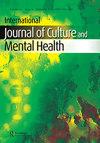The role of Filipino masculine ideology on the adaptive coping, psychological well-being and vicarious trauma of first responders
Q1 Social Sciences
International Journal of Culture and Mental Health
Pub Date : 2018-10-02
DOI:10.1080/17542863.2018.1561736
引用次数: 9
Abstract
ABSTRACT The exposure of first responders to emergencies and disaster puts them at high risk of experiencing vicarious trauma. First responders are typically male and literature suggests that a negative connotation of masculinity creates a stigma that leads to low help-seeking behaviour and poorer psychological outcomes. This study examines Filipino dimensions of masculinity namely perceived cognitive ability, sense of community, and assertive dominance and how these dimensions predict adaptive coping and its outcomes. Surveys of 135 male first responders reveal that perceived cognitive ability and sense of community positively predict adaptive coping. Results also support the hypothesis that adaptive coping mediates the relationship of perceived cognitive ability, and sense of community positively with psychological well-being. However, there was no relationship between assertive dominance and adaptive coping. Rather, assertive dominance predicted vicarious trauma. The results contribute to the literature by showing that masculinity ideologies have both positive and negative relationships with mental health. This has implications on how emergency organizations can help support first responders.菲律宾男性意识形态对急救人员适应性应对、心理健康和替代性创伤的影响
急救人员在突发事件和灾难中的暴露使他们处于经历替代性创伤的高风险中。第一反应者通常是男性,文献表明,男性气概的负面内涵会造成一种耻辱,导致寻求帮助的行为减少,心理结果更差。本研究考察了菲律宾男性气质的维度,即感知认知能力、社区意识和自信支配,以及这些维度如何预测适应性应对及其结果。对135名男性急救人员的调查显示,感知认知能力和社区意识对适应性应对有正向预测作用。研究结果也支持了适应性应对在感知认知能力、社区意识与心理健康之间起到正向中介作用的假设。然而,自信支配和适应性应对之间没有关系。相反,武断的支配预示着替代性的创伤。研究结果表明,男性意识形态与心理健康既有积极的关系,也有消极的关系。这对应急组织如何帮助支持第一响应者有影响。
本文章由计算机程序翻译,如有差异,请以英文原文为准。
求助全文
约1分钟内获得全文
求助全文
来源期刊

International Journal of Culture and Mental Health
Social Sciences-Cultural Studies
CiteScore
2.10
自引率
0.00%
发文量
0
期刊介绍:
This title has ceased (2018). This important peer-review journal provides an innovative forum, both international and multidisciplinary, for addressing cross-cultural issues and mental health. Culture as it comes to bear on mental health is a rapidly expanding area of inquiry and research within psychiatry and psychology, and other related fields such as social work, with important implications for practice in the global context. The journal is an essential resource for health care professionals working in the field of cross-cultural mental health.Readership includes psychiatrists, psychologists, medical anthropologists, medical sociologists, psychiatric nurses and social workers, general practitioners and other mental health professionals interested in the area. The International Journal of Culture and Mental Health publishes original empirical research, review papers and theoretical articles in the fields of cross-cultural psychiatry and psychology. Contributions from the fields of medical anthropology and medical sociology are particularly welcome. A continuing dialogue between members of various disciplines in various fields is encouraged. The aim of the journal is to encourage its readers to think about various issues which have clouded cross-cultural development of ideas. The journal lays special emphasis on developing further links between medical anthropology, medical sociology, clinical psychiatry and psychology, and implications of the findings on service provisions. The journal is published four times a year. The style of reference is Harvard. All research articles in this journal, including those in special issues, special sections or supplements, have undergone rigorous peer review, based on initial editor screening and anonymized refereeing by at least two independent referees.
 求助内容:
求助内容: 应助结果提醒方式:
应助结果提醒方式:


